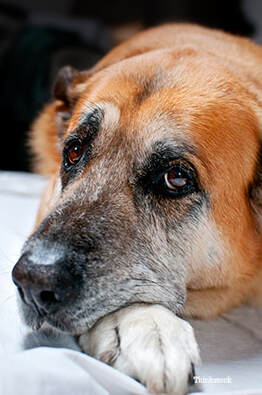Cognitive Dysfunction (CD)

Cognitive Dysfunction (CD) is a syndrome of brain aging seen in dogs (and also cats) that is similar in symptoms to Alzheimer's disease in humans. Another name for this syndrome is "Old Dog Dementia".
CD leads to alterations in awareness and decreased ability for learning and memory. What most owners notice is that their pet has periods of confusion or seems distant or lost. For some pets these symptoms are sporadic or worse at certain times of the day or night.
Other indications of CD may include:
The exact cause of CD is unknown. Possible causes may include: declining brain cell function, less efficient blood flow to the brain, or a buildup of the byproducts of normal metabolism. There may also be a genetic component.
The diagnosis for CD is made based on physical exam findings and a thorough medical history. Bloodwork and urine tests are typically normal but should be performed to rule out other potential causes for symptoms. Other diseases that may have similar symptoms include: painful conditions like arthritis or bladder infections, organ failure, and some forms of cancer. Hearing and vision loss that occurs with age may also contribute to symptoms.
There is no cure for Cognitive Dysfunction. Despite our best efforts, patients with CD often continue to decline, but early intervention is the key to slowing progression of this disease.
Visit these links for more information on Cognitive Dysfunction:
Why Are My Senior Dog's Behavior Changing?
Cat Dementia: Symptoms, Causes, and Treatment
CD leads to alterations in awareness and decreased ability for learning and memory. What most owners notice is that their pet has periods of confusion or seems distant or lost. For some pets these symptoms are sporadic or worse at certain times of the day or night.
Other indications of CD may include:
- a withdrawal from interaction with family members; seeking less petting or attention
- staring at walls or into space
- sleeping more during the day or restlessness at night
- house soiling
- increased pacing or wandering aimlessly
- frequent trembling or shaking
- ignoring commands or not responding when their name is called
- becoming lost or getting stuck in corners or behind furniture
- decreased activity
- failure to recognize familiar people
The exact cause of CD is unknown. Possible causes may include: declining brain cell function, less efficient blood flow to the brain, or a buildup of the byproducts of normal metabolism. There may also be a genetic component.
The diagnosis for CD is made based on physical exam findings and a thorough medical history. Bloodwork and urine tests are typically normal but should be performed to rule out other potential causes for symptoms. Other diseases that may have similar symptoms include: painful conditions like arthritis or bladder infections, organ failure, and some forms of cancer. Hearing and vision loss that occurs with age may also contribute to symptoms.
There is no cure for Cognitive Dysfunction. Despite our best efforts, patients with CD often continue to decline, but early intervention is the key to slowing progression of this disease.
- It is very important to maintain a daily routine including as much exercise, play, and training as is practical for your pet's age and health. This form of mental and physical stimulation has been shown to reduce or slow the progression of CD.
- It is best to feed a high quality diet. Diets that are supplemented with antioxidants like vitamin E, vitamin C, and omega fatty acids may help. Hills Prescription Diet B/d or Purina Pro Plan Neurocare are specially formulated for these patients- please ask your veterinarian for more information.
- Some pets may benefit from omega fatty acid or antioxidant supplements.
- Depending on your pet's health status and symptoms, your veterinarian may recommend a medication called Selegiline. Selegiline is a drug that increases dopamine levels in the brain. Increased dopamine helps the brain to function more normally with the goal of allowing your pet to think more clearly, remember more, and enjoy a better quality of life. Selegiline is a life long medication; although, it may not be beneficial for all pets. Potential side effects may include: vomiting, diarrhea, decreased appetite, increased salivation, and trembling. Please make your veterinarian aware of all other medications that your pet is currently taking.
Visit these links for more information on Cognitive Dysfunction:
Why Are My Senior Dog's Behavior Changing?
Cat Dementia: Symptoms, Causes, and Treatment
